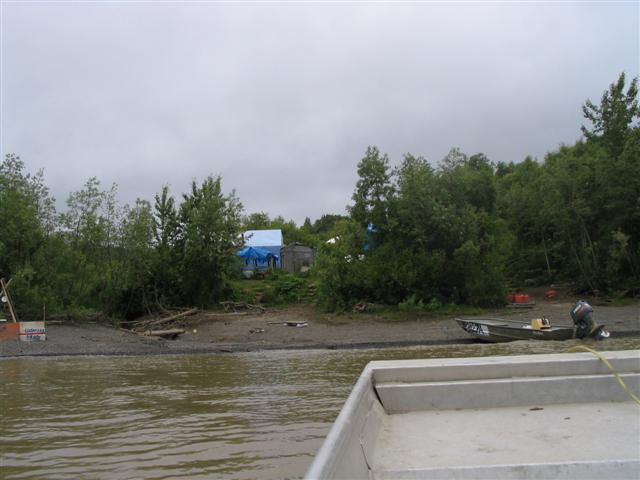( Log In ) Log In is for TREC Teachers & Researchers only
  |
| Amy_Clapp |
 Jul 11 2005, 06:32 PM Jul 11 2005, 06:32 PM
Post
#1
|
 TREC Teacher    Group: TREC Team Posts: 84 Joined: 27-April 05 Member No.: 6 |
Well we woke up this morning to a dark, dreary, cold day. However, I guess this weather is somewhat typical here for this time of year. We had made tentative plans to get together with Martin Kelly at around noon, and we wanted to do some shore sampling before that, so we bundled up and headed out the door. We wandered up and down the shore of the Yukon trying to find the best sampling site. We are only taking a small amount of samples from the shore, but even these little samples can add to the larger picture of the PARTNERS Project and provide valuable information to the scientists. We will be doing our main sampling day on Tuesday, so we will take shore samples from different locations before that. It was fun to walk up and down the shore side on each side of Pilot Station. There were some cool cliffs and rocks along the shore.
 After exploring and getting samples, we headed back to our dwelling to get some lunch. Just as we were finishing up, Martin Kelly called to see if we wanted to go up to the Fish and Game camp up the river. I was eager to check out what that was all about, and before I knew it we were climbing into Martin Kelly’s boat and we were on our way.  The Alaska Fish and Game set up a camp here for about four months to monitor the salmon and populations. The person who does the PARTNERS Project samples seven times a year, who I will meet on Monday or Tuesday, is with the USGS (U.S. Geological Survey). Anyway, the Fish and Game guys use sonar to get nearly continuous data on the fish, and they put gill nets out every day to see what type of fish are running in the rivers. It was really cool because on the computer screens, which was connected to the sonar machine, I could see the fish swimming. This data is important for any number of reasons, including making sure that the commercial fisheries don’t overcatch the fish population, and also it continuously monitor what’s going up the river, as the Yukon river headwaters are in Canada and according to treaties, the U.S. has to make sure that the U.S. doesn’t fish out the waters before the fish make it to Canada, so in essence, this fish camp is monitoring and managing the natural resource of fish. The guys here work 7 days a week through all hours of the day for four straight months—that’s dedication.   After visiting and learning about the fish camps, Martin took us up the river and into a tributary where he likes to fish and take his kids to go swimming. Once we were off the main arm of the Yukon, the water cleared up a lot (the water in the Yukon also carries a lot of sediment). It was sort of swampy and in parts it looked like a lake as it would widen out. Martin and his ancestors have lived here in the Pilot Station area for quite sometime, and he knows a lot about the nature of the land—where to hunt, where to find berries, etc. He is very proud of his traditional ways, yet is also modern in much of what he does. It is so interesting to me to visit with these people in the small villages, and to learn how much their lives have changed in the last 50-100 years, and how them manage to mold two different lives together. They are proud of their heritage and their knowledge of the land, and they should be. It seems as though it would be very empowering to know that you can survive off the land. Anyway, when we got back to the church, there was someone there, and low and behold the priest had shown up for the weekend. So we packed our stuff all up and called Martin Kelly again (good thing he is such a great guy for helping us out) and we managed to find our way into the old post office and get settled there. It isn’t quite as “cozy” as the church building, but we like it because it is more in town, and we have a great picture window to watch the river from. It is amazing for me to watch the river to see how rough it can get—and boy the swells on the river can get huge!!! |
  |
2 User(s) are reading this topic (2 Guests and 0 Anonymous Users)
0 Members:

|
NSF Acknowledgment & Disclaimer | Time is now: 1st November 2024 - 12:10 AM |
Invision Power Board
v2.1.7 © 2024 IPS, Inc.








